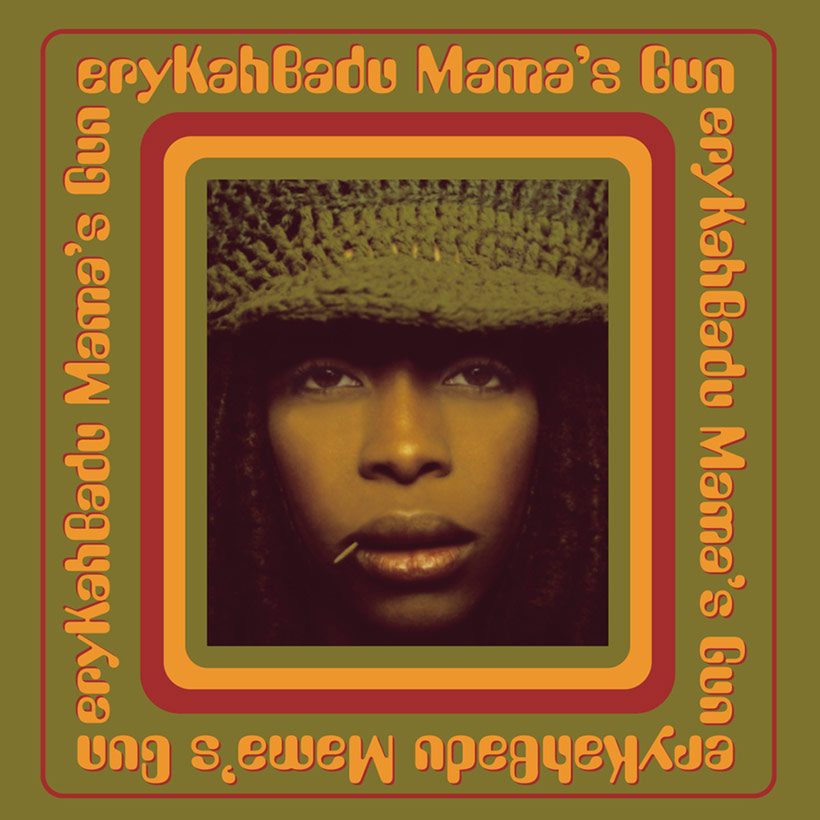‘Mama’s Gun’: Erykah Badu’s Lessons On Self-Survival
While ‘Baduizm’ turned her into a household name, ‘Mama’s Gun’ cemented Erykah Badu’s status as the new face of R&B.

Erykah Badu first burst into the scene in 1997, with the release of her paradigm-shifting debut album, Baduizm. Showcasing an impressive range of vocals that prompted listeners to liken her to Billie Holiday, the album also saw Badu receive credit for birthing neo-soul. In truth, however, she created an atmosphere all her own. No two of her songs are the same, but a Badu track is undeniable: a sensual, brooding sound with vocals that glide up and down. Markedly hopeful and authentic, her music is the aural equivalent of the feeling of sunshine on the back of your neck, and on her second album, Mama’s Gun, Badu took a deep dive into the pivotal moments of what it meant to be alive, learning how to bolster oneself against a crushing tidal wave of emotion.
Reflecting the state of black womanhood
While Baduizm turned her into a household name, Mama’s Gun cemented her status as the new face of R&B. After taking several years off to raise her first child, Badu returned to the studio to record her second album, much of which was inspired by love and her relationship with her then-partner, Andre Benjamin. Leaning into a more organic sound with less-elusive lyrics, Badu opted to speak to the state of black womanhood and the world around her.
For those expecting another downtempo collection of sultry meditations, the live-band funk opener, “Penitentiary Philosophy,” puts that notion to rest. While Mama’s Gun is stylistically ambitious, the sound is also comforting and familiar. Engineer Russell Elevado introduced a warm, honey-like sound by exclusively using vintage microphones and recording equipment for the album, which was recorded in the famous Electric Lady Studios. The studio regularly housed a collective of musicians who called themselves The Soulquarians, frequent collaborators who drew inspiration from one another, solidifying the neo-soul sound of the early 00s with era-defining albums like D’Angelo’s Voodoo and Common’s career-shifting Like Water For Chocolate.
Flowing from past to present
The tone of Mama’s Gun fits in well with the rest of Badu’s catalog. The singer has a certain knack for ebbing and flowing in the present, with feelings of nostalgia tucked in her back pocket, and wistful perseverance toward the future. This is where the genius of her artistry lies: in commentary that leans toward melody, and the overflow of tension and feeling in every word.
“Bag Lady” was the first single released from the album, telling a story of a woman bringing too much heavy, emotional baggage into a new relationship. Badu warns to “pack light” and ease into things with self-love, not allowing the past to dictate her future: “Bag lady you gone hurt your back/Dragging all them bags like that/I guess nobody ever told you/All you must hold onto/Is you, is you, is you.”
While Baduzism was dense with metaphor, Mama’s Gun – specifically “Bag Lady” – is more grounded and lyrically direct, addressing the universal problems of relationships. The song landed Badu her first Top 10 hit, peaking at No.6 on the Billboard Hot 100, and was later nominated for two Grammy Awards.
Digging with Dilla
For the album’s second single, “Didn’t Cha Know,” Badu tapped visionary hip-hop producer J Dilla. Around a sample of Trika Blue’s “Dreamflower,” she built a languid track about indecision and ambivalence toward the future, picking up another Grammy nod in the process. Mama’s Gun’s final single, “Cleva,” was another Dilla production: a soulful, jazzy number that perfectly encapsulated Badu’s effortless sound while conveying life lessons. She also got an assist on the track from soul-jazz pioneer Roy Ayers on vibraphone.
Saving perhaps the best to last, on the album’s closer, “Green Eyes,” Badu delivers a range of emotions into one sprawling, ten-minute ballad. As she cycles through the stages of ending a relationship – from jealous ex-lover to acceptance and then attempts at reconciliation – the musical stylings shift with each section of the song. Truly one of Badu’s career highpoints, it also marks one of the best R&B songs of the decade.
Shortly after Mama’s Gun’s release, on November 21, 2000, it was certified platinum in the U.S. and went on to receive silver certification in the UK. There is no shortage of honesty in Erykah Badu’s music, and Mama’s Gun serves as a collection of adages, rather than a stylistic time capsule, speaking to moments in time when self-revolution is necessary for growth.












